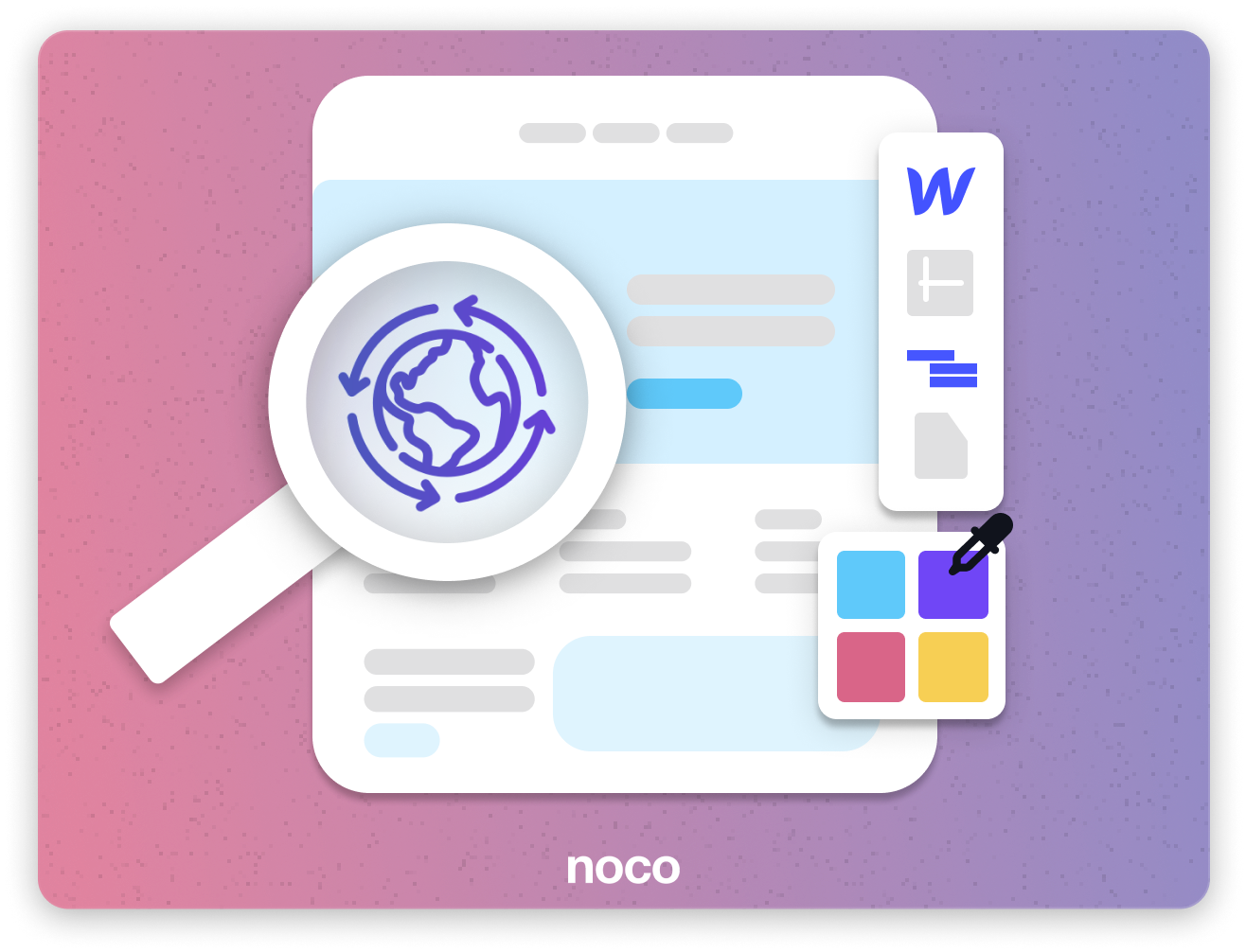In an industry where 'more' often equates to success - more functionality, more users, more data - - is progressively acknowledging the necessity to consider its environmental impact. For experienced no-code web developers, the role of no code solutions in enhancing sustainability might not be a revelation, as it promotes efficiency and lessens the need for extensive computational resources. Yet, the entire scope of no-code's potential in paving the way towards genuinely sustainable tech firms warrants a more profound exploration.
The Intersection of No-Code, Cloud, and Carbon Efficiency
When discussing sustainability in tech, the conversation is undoubtedly incomplete without understanding the contribution of cloud computing. The rapid proliferation of cloud-based solutions has brought forth a medley of challenges and opportunities in our pursuit of a more environmentally friendly tech landscape. The crossroads of no-code development and cloud services is a fertile ground for potential carbon reduction. Cloud services work on a shared resource model, making the most of energy use in a manner that's more efficient than isolated, on-premise servers. With no-code tools that merge seamlessly with these cloud-based services, developers can play a pivotal role in reducing carbon emissions, all while ensuring scalability and security of their applications.
However, the journey towards carbon efficiency is not without its difficulties. One of the prominent challenges is the fact that not all cloud service providers prioritize sustainability. Therefore, choosing a cloud provider that aligns with sustainable practices can be a complex task.
Additionally, the process of migrating from traditional servers to the cloud can be resource-intensive and may require considerable effort and expertise. In the realm of no-code development, while it's more energy-efficient, there can be instances where it may not provide the required flexibility for highly complex and customized applications. Balancing these needs without compromising on sustainability goals is an ongoing challenge. Despite these challenges, the promise that the blend of no-code and cloud computing brings to the table in terms of carbon efficiency is compelling, urging us to continue refining our approaches and solutions.
The Silent Polluter: Code Waste
Code waste, akin to physical waste, contributes to the carbon footprint of tech companies. Traditional software development often necessitates writing massive amounts of code, which may either remain unused or constantly patched and updated, causing an escalation in energy use over time. Code waste doesn't just have an environmental impact; it can also take a toll on the developers themselves. Traditional software development often requires writing extensive amounts of code, much of which may end up unused or continually patched and updated. This can create a sense of frustration and demoralization among developers, who invest significant time and effort into creating these lines of code. The constant cycle of creating and discarding code can lead to stress and burnout, contributing to a less than ideal working environment. Moreover, the presence of "bloatware" in applications, while negatively affecting a company's environmental footprint, can also impact the morale of developers. They may feel their efforts are being wasted on developing features that are not used or appreciated by users. This can lower job satisfaction and impact their overall well-being.
In stark contrast, no-code development, with its modular and reusable components, drastically cuts down the volume of 'code waste'. By offering modular and reusable components, no-code development not only reduces 'code waste' but also empowers developers by ensuring their efforts are effectively utilized. The process of reusing and recycling components has the potential to boost morale, as developers can see the tangible impacts of their work, leading to a more fulfilling and sustainable development environment.
Balancing Sustainable Complexity: The Trade-off Paradigm
It's important to understand that not every aspect of a complex application can or should be moved to a no-code platform. Despite the impressive advancements in no-code platform capabilities, there will always be scenarios where custom coding is indispensable for specific functionalities. The sustainability challenge arises in discerning when to employ no-code versus custom code, to strike an equilibrium that satisfies the application's complexity while minimizing its environmental impact. This demands careful consideration and thorough analysis during the development phase.
Towards Advanced Sustainability: Embracing the Lifecycle
Approach
The cornerstone of building a sustainable tech company is the adoption of a lifecycle approach. This involves considering the environmental impact of software right from its development and use, through to its eventual end-of-life. Embracing a holistic perspective allows companies to manage the entire carbon footprint of their products and services. Steps like reducing code waste through no-code development and optimizing energy usage via cloud-based solutions are fundamental parts of this journey. However, sustainable practices need to extend to how software is used, maintained, and eventually retired.
Creating a culture of continuous improvement and eco-consciousness within tech organizations is an essential aspect of the lifecycle approach. This involves encouraging eco-friendly practices among developers, setting sustainability targets, and tracking progress over time. Promoting energy-efficient coding practices and advocating for the responsible use of computational resources are collective strategies that can contribute to a greener tech landscape.
Pioneering Ethical Consumption and Responsible Innovation
Beyond the realm of development, tech companies can also have a significant positive influence on the environment by championing ethical consumption and responsible innovation. This involves pondering over the environmental and social repercussions of the technologies they produce. From sourcing raw materials for hardware production to the impact of software applications on user behaviors, every decision can create a ripple effect on sustainability.
Tech companies can facilitate their products and services to promote sustainable practices among users. This could include designing applications that incentivize responsible energy usage or incorporating features that enhance environmental awareness. By harnessing the power of technology to advocate for sustainability, companies can extend their positive influence beyond their immediate operational context.
Waste Reduction in Tech: Your Role in Making an Impact
It's time to get serious about reducing waste in the tech sphere, and it starts with you and me. First things first, we need to check our tech cravings. Does our smartphone really need an upgrade just because a new model is out? Holding off on those unnecessary updates means our gadgets live longer and less e-waste ends up in landfills. On the coding front, let's embrace the no-code and low-code revolution. It's a brilliant way to cut down on code waste, and it makes our computational resources work smarter, not harder. Plus, it's worth giving a thumbs-up to cloud-based services. They’re like the carpool lane for data, sharing resources for better energy efficiency compared to traditional solo servers.
But it’s not all about what we do—it's also about who we support. Let's stand behind those tech companies that are stepping up their recycling, upcycling, and general green game. And when our devices reach the end of their lives, let's make sure they retire gracefully. That means handing them over to certified e-waste recycling programs, where they'll be treated with care. Each step we take in this direction brings us closer to a tech industry that’s kinder to our planet.
Conclusion: A Call to Action
As industry practitioners, we possess both the ability and responsibility to reshape the narrative around tech and sustainability. No-code development goes beyond being just a shortcut or a method of cost-reduction—it can serve as a vital instrument towards a more sustainable tech industry, curtailing carbon footprints and propelling us towards a more environmentally conscious future. Sustainability in tech isn't a far-fetched ideal; it's an unfolding reality that we, as industry professionals, hold the power to shape.
What are your contributions towards reducing environmental impact today? Here are a few steps we can all take:
- Embrace no-code development: Developers can explore no-code platforms to streamline their projects, reduce code waste, and promote eco-friendly practices in software development.
- Optimize cloud usage: Whether for personal projects or managing a tech company, make conscious choices regarding cloud services. Choose cloud providers that prioritize energy efficiency and sustainability.
- Promote sustainability in tech organizations: If in a leadership position, integrate sustainability goals into your company's mission and values. Foster a culture that embraces eco-conscious practices and continually assess progress towards sustainability targets.
- Advocate for green tech solutions: As consumers and users, our preferences can shape the direction of the tech industry. Support companies that prioritize sustainability and ethical consumption, and champion green tech solutions that enhance energy efficiency and reduce environmental impact.
- Educate and raise awareness: Raise the bar on the discourse around sustainability in the tech industry. Share the advantages of no-code development, cloud optimization, and responsible innovation. By spreading awareness, we can inspire more individuals and companies to take proactive measures.
In essence, building a sustainable tech company requires concerted action. By leveraging the power of no-code development, cloud efficiency, and a lifecycle approach, we can contribute towards a greener and more environmentally conscious tech sector. It's our collective responsibility to make a positive impact on the environment, one code at a time.
About Noco:
At Noco we specialize in working with fast-moving internet businesses to create online presences that keep up with their pace. Creating fully immersive websites that align with our client’s goals is our bread and butter.
If you enjoyed this post, join our community of no-code founders for free.
We are the world's largest no-code community. Helping founders and businesses grow faster with the power of no-code.










